We have a strict honesty policy, but please note that when you buy through our links, we may earn a commission. Learn more.
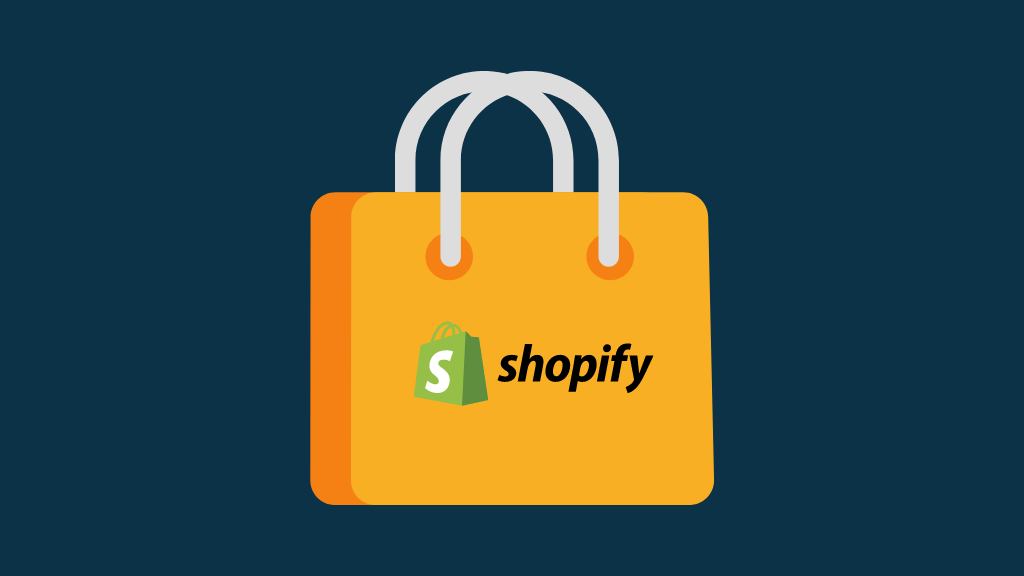
In this post, I’m going to show you how to buy a Shopify store safely and successfully. Read on for a step-by-step overview of the process and the key mistakes to avoid.
Please note: this article is about buying an existing Shopify store. If you’re looking for information on how to set up a new Shopify store, please see our guide to setting up a Shopify store, our Shopify review or our Shopify free trial resource page.
Online businesses differ in a lot of respects from their ‘bricks and mortar’, physical counterparts, but they share one key characteristic: you can either start one from scratch, or you can buy one. And, assuming you have the capital to hand, the second approach can end up being the safer bet.
This is because by buying an established business, you can avoid a lot of the financial risk that comes with setting one up from scratch — and be more confident of seeing a return on your investment.
Now, because ‘physical’ businesses have been around for a long time, buying one is a fairly straightforward process — there are lots of brokers, accountants and lawyers available to lend a guiding hand (albeit for a fee!).
However, buying an online business like a Shopify store can be a much less straightforward affair. This is because the internet is in many ways a ‘wild west’ and the businesses it contains can be very young.
But with a bit of planning and due diligence, you can buy a Shopify store successfully. Let’s go through the steps involved.
1. Narrow down your requirements
Before you start looking for a Shopify store to buy, it’s best to narrow down your requirements.
You need to be clear about:
- how much money you can spend on your acquisition
- how much time you can give it
- the niche you want to sell in.
Let’s look at these three considerations in turn.
Budgeting
It’s actually possible to buy Shopify stores for just a couple of hundred dollars — for a site that has been set up and is fully functional but is yet to generate a profit.
Equally, you can spend millions of dollars on an established site that generates tens of thousands of dollars a month.
But how much are you prepared to invest? It’s obviously important to be very clear on this point, so define exactly how much you can afford to spend on your acquisition before you start making offers.
Your time
Next, you need to work out how much time you are prepared to spend on the day-to-day aspects of running the store you purchase.
Now, some online businesses — particularly dropshipping businesses — can ‘run themselves’ to a reasonably large degree, but others will involve a LOT of work (be that in terms of product manufacture, marketing, PR or operations).
So, if you are time-poor, you may need to stay clear of the latter category — even if you spot a profitable store and have the cash to buy it.
Niche
Finally, you need to think about what products you are comfortable with selling.
Are there niches you are particularly experienced with, or particularly want to avoid?
Do you have any ethical concerns about where certain dropshipping suppliers source their products?
It’s good to have a clear vision when it comes to product type ready before you start looking for a Shopify store — this will help you spot a good opportunity more easily.
And to do this you will need to…
2. Do your research
Once you’ve got a clear sense of how much time and money you can put into a business, along with an idea of the sort of business you are hoping to buy, it’s time to do some preliminary research on the stores that might meet your criteria.

But how do you do actually this?
Where can you find a Shopify store to buy?
Well, the easiest and safest way to find Shopify stores for sale is to work with a brokerage service that organizes the purchase and sales of websites. There are quite a few of these around, including Flippa, FE International, Motion Invest and Empire Flippers.
These services typically let you browse websites for sale using a lot of criteria, for example:
- Price
- Revenue
- Store age
- Business type (dropshipping, inventory, print-on-demand etc.)
- Industry
- Platform (Shopify, WordPress etc.).
Try to use these filters judiciously — based on your earlier ‘narrowing down’ exercise — to identify some stores to buy.
(Obviously in your case you’ll be aiming to buy a Shopify store — so pay particular attention to ‘platform’ filters).
Once you’ve got a set of contenders in front of you, you need to take a careful look at the data provided about each store, to see which ones look like reasonably safe purchases.
The key thing to ask yourself about any data provided is this: has it been vetted by anyone?
This is where the value of working with a broker comes in — so long as you’re dealing with a reputable company, you can have a reasonable degree of confidence that the data provided can be trusted.
(It’s generally not in a broker’s interest to sell dodgy businesses).
Nonetheless, it’s still worth trying to get as much information about the person selling a store as possible — quiz your broker carefully on this.
Ask yourself questions like:
- Does the seller come across as a trustworthy individual?
- What is their motivation for selling the store?
- Does the seller give the impression that they are just trying to make a quick buck, or do they have genuinely good reasons for selling their business?
If you feel that you are dealing with somebody you can trust, and looking at a store that looks genuinely profitable, it’s time to drill down into the performance figures in a bit more depth — and do some due dilligence.
Finding a broker to buy a Shopify store from
If you’re interested in buying a Shopify store, it’s worth checking out the listings on the Empire Flippers website.
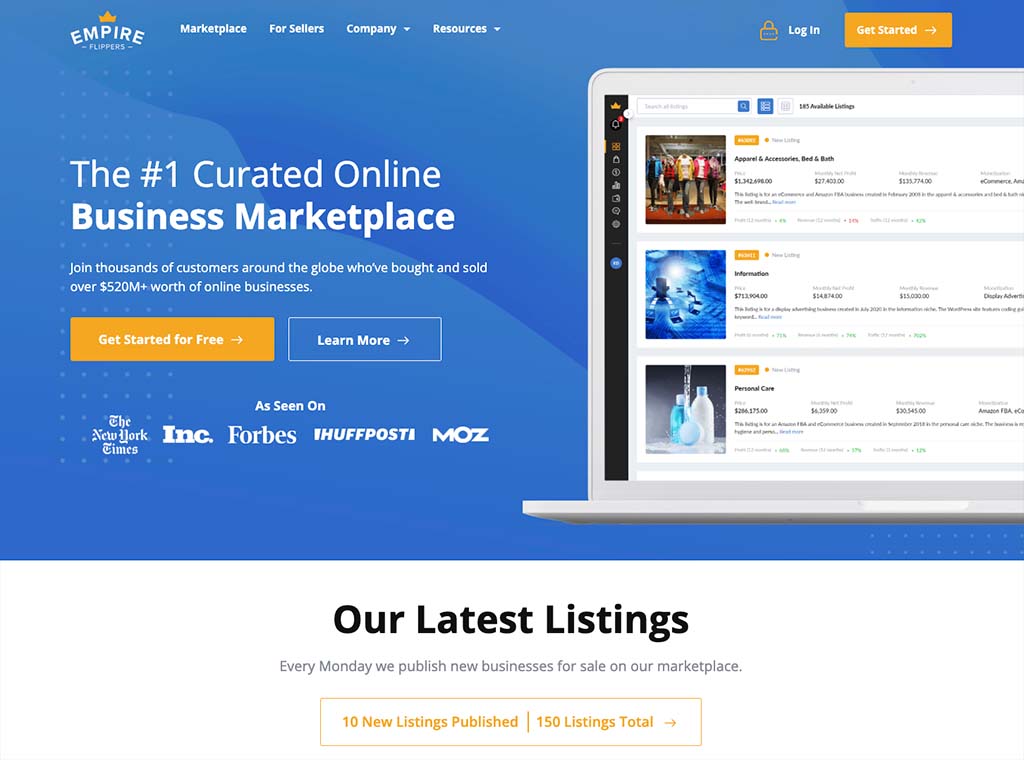
Empire Flippers is one of the web’s most trusted online marketplaces for buying and selling websites (we’ve worked with them in various ways ourselves) and the company’s vetting process is extremely thorough.
3. Perform due diligence
Once you’ve identified a Shopify store that you would like to buy, it’s time to proceed with due diligence. Performing this is arguably the most important aspect of buying a store and it is crucial to get it right.
These are the questions you need to get answers to when buying your store:
Where is the site traffic coming from?
There are two main types of site traffic:
- the traffic you pay for, via advertising
- the traffic that’s free and comes from search engines — organic
For obvious reasons, the latter is generally more valuable to you.
(That said, paid-for traffic can work well too — so long as it’s clearly generating a return on investment).
Either way, you need to be crystal clear about where your seller is getting his or her site traffic from.
If the seller is relying on paid advertising to generate traffic and profit, you will need to be able to replicate this when you take over the store.
Accordingly, it’s important to get as clear an understanding as possible of the budgets and mechanisms involved, and a commitment that a full overview of the current advertising process — as well as after-sales support specifically on this aspect of things — will be supplied to you when you buy the store.
If the seller is claiming that their site traffic is largely organic, you should ask to see Google Analytics and Shopify dashboard reports to confirm this fact.
Ideally, you should be temporarily added as a read-only user of the seller’s Google Analytics account, so that you can have first hand access to the stats. This makes the prospect of a seller trying to pass off doctored PDFs from Google Analytics as evidence of organic search results less likely!
When investigating organic traffic to a site, it’s also worth using a tool like Ahrefs or Semrush to check the backlink profile of the store.
Backlinks — external links to a site — are one of the best indicators that a site will perform well in organic search results, and both Ahrefs and Semrush allow you to check any domain’s backlink profile simply by entering the relevant URL into the software.
If there aren’t many backlinks pointing to the store you’re thinking of buying, it’s worth thinking twice about the purchase.
Equally, if there are loads of backlinks to the site, but they are all ‘spammy’ or low-quality in nature, this should ring alarm bells about the sale — while dodgy link building practices sometimes temporarily boost a site’s performance in search results, they usually get spotted by Google’s algorithms (which can lead to a significant drop in traffic overnight).
And of course, if you see lots of amazingly high-quality backlinks pointing to the store, then great! This is usually a good indicator that your new store will perform well in search results.
(Note: you’ll always see some poor quality links pointing to a website — and often quite a lot of them if you’re dealing with a high-traffic, well-established website. The thing to watch out for is an absence of a significant number of high-quality, relevant ones).
ℹ️ Due dilligence and data rooms
A ‘data room‘ is often used during a business sale to house all the necessary due dilligence information pertaining it. This is a secure online repository where a seller can store, manage and share all the critical documents and information that the buyer needs to access.
How much does it cost to run the store?
The next thing you need to get to grips with is the financials. You need to be very clear about how much it costs to run the Shopify store you’re thinking of purchasing, so ask the seller for the full list of expenses.
Costs that you should enquire about include:
- inventory
- marketing (paid advertising campaigns, both online and offline)
- PR
- SEO
- software
- staff
…and anything else that might be specific to the business. The aim is to get a really clear picture of what the seller is spending to generate their sales.
What’s included in the sale?
You should ask the broker or seller exactly what assets are included in the sale.
Ideally you should try to get all of the following as part of your purchase:
Domain
Mailing list
Social media accounts
Inventory
Process overviews (also known as ‘Standard Operating Procedures‘ or SOPS)
- Brand assets
After-sale support
All of the above are very important, but the domain (www.thestorename.com etc.) is particularly important if you are buying an established business that relies on organic search traffic to generate sales.
This is because if the seller keeps the domain, he or she is also keeping all the backlinks pointing to it — and since backlinks are such a key part of performing well in search results, your new business will be deprived of its traffic from the get-go.
How good are the social accounts and mailing lists?
Social followings and subscriber lists are hugely important to generating repeat business and/or awareness of new products and services. Accordingly, you need to ensure that these are made up of genuine followers and subscribers.

To verify the quality of social followings, examine the profiles being included as part of the sale, taking a particular look at:
- the engagement rates (i.e., how many people interact with posts)
- a selection of followers (try and spot if they are ‘real’ people or fake accounts)
- the amount of non-paid social traffic to the Shopify store you’re buying
- whether there are any restrictions on advertising using the assets (for example, disabled Facebook ad accounts etc.).
Given the importance of e-newsletters to driving sales, it’s also essential that you have full confidence in the quality of the mailing list that you are inheriting as part of the sale.
To verify the quality of a mailing list, ask for access to the seller’s email marketing tool, and check the open and click-through rates of recent campaigns.
You should also ask how the email addresses on the list have been captured — it’s important, particularly in an era of GDPR, to be certain that any processes used by the seller for getting people onto a mailing list are legally robust.
For example, if your seller built up a large mailing list through scraping addresses from the Internet, or bought a bunch of email addresses from dubious suppliers, you may find yourself in a situation where you are legally prohibited from emailing the list — and not getting great results from it anyway (because you end up sending unsolicited mail to a low-quality list).
What is the person selling the site like?
So far, when discussing the due diligence process, I’ve talked a lot about using metrics and stats as a way to verify whether buying a particular Shopify store is a good idea or not.
However, it’s crucial to think about the human dimension too — at the end of the day, what you are purchasing has been created and is being sold by a person, not an algorithm.
So ideally, you need to work out what that person is like before giving them a lot of your money!
Usually, when you get to a certain stage in a buying process, a broker will arrange a conversation between you and the seller. It’s worth reflecting on any conversations you have with the seller, asking yourself:
- Is this person trustworthy?
- Why is he or she selling the store?
- Can I be confident he or she will support me with any questions after I’ve made the purchase?
Of course, people being the way they are, it can be difficult to find entirely satisfactory answers to the above questions.
But if you find yourself dealing with somebody who seems shady, won’t give you a genuine reason for selling and doesn’t engage with any queries you may have about the business in a meaningful way, it may be time to exercise caution about the purchase.
Can I have a behind the scenes look?
If at all possible, ask the seller if you can have a ‘behind the scenes’ look at the business. This could involve screenshares and read-only access to website analytics and apps.
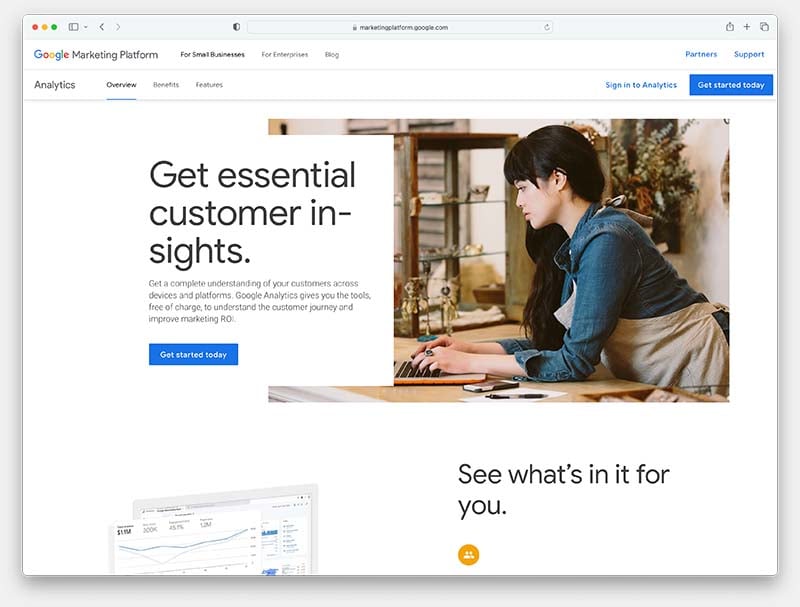
The more of a glimpse you can get of the mechanics of the business, the better you’ll be able to make a sound decision as to whether it is worth purchasing or not.
And of course, the more willing a seller is to give you this access, the more confident you can be that they are a trustworthy person to do business with.
Is this the best use of my capital?
Whenever you decide to invest in a business it is always advisable to get professional financial (and legal) advice beforehand.
Although buying a good Shopify store can ultimately be very profitable, depending on your circumstances there may be more effective ways to invest.
So, particularly if you are planning on investing a large amount of money in a store, it makes sense to talk to a financial advisor first.
And if you do decide to proceed with purchasing a Shopify store (or indeed any business!), it’s best to involve a lawyer in the process. Although this will add to expenses, a lawyer with experience in business purchases, mergers and acquisitions (M&A) etc. will be much better able to spot problems with a business sale than you.
4. Start the buying process
If after all your browsing, research and due diligence you arrive at the conclusion that you wish to proceed with buying a Shopify store, it’s time to start the transaction process.
This often done via an ‘Escrow’ method — an approach to business purchases that can help reduce the risk of fraud.
With ‘escrow’, the purchase money is protected by a third party until both the buyer and the seller agree that the conditions of the deal have been met.
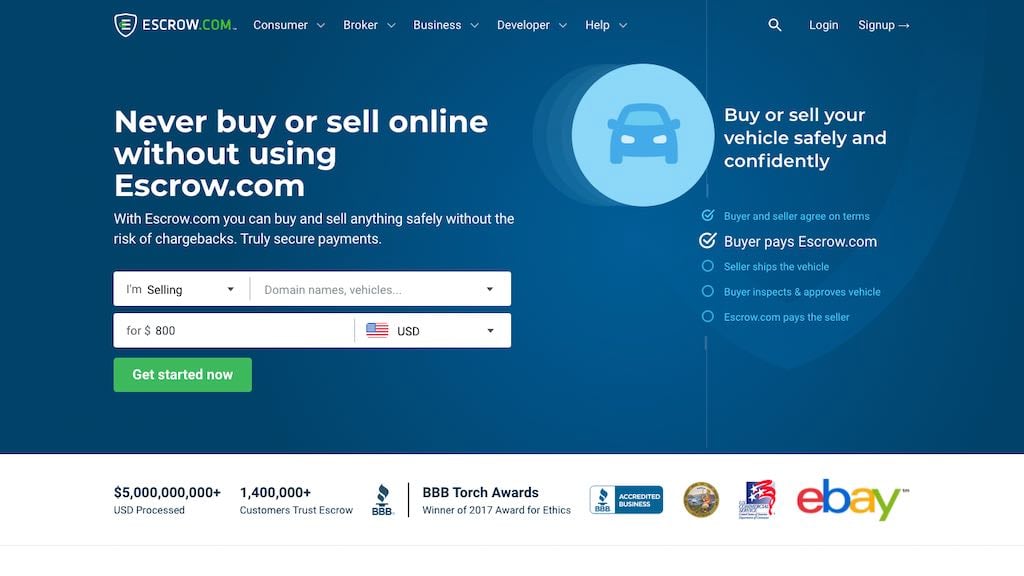
Because of the way that the escrow method of payment works, before starting to buy the business, you need to establish a very clear set of conditions for purchase along with an exhaustive checklist of everything you are expecting to receive as part of the purchase — domain, mailing list, social media accounts, after-sales support and so on.
(That’s where the value of involving a lawyer kicks in!).
Once you’ve transferred the purchase funds to the escrow account, you will usually be provided with access to your newly purchased Shopify store for an agreed ‘inspection period’ during which you can perform an in-depth review of the business to ensure that all the data, orders and assets are as you’d expect.
Assuming you are happy, your funds will then be released to the seller once the inspection period is over.
And that’s it — you’re the proud owner of a Shopify store.
🤔 What about buying a Shopify store privately?
It is of course possible to buy a Shopify store privately (i.e., without a brokerage service being involved) — you can approach store owners directly to see if they’d be interested in an acquisition.
The advantage of this purchase method to buyers is that they may be able to agree a lower price for a business — there will be less bidders involved in the purchase process. A seller benefits by avoiding the commission charged by a broker.
However, if you decide to buy privately, the importance of business vetting, due diligence, financial advice, legal advice and the escrow method become much more pronounced — there are typically more safeguards available from a broker.
Related Shopify resources from Style Factory
- How to sell your Shopify store (blog post)
- How to sell your Shopify store (video with Greg Elfrink)
- Shopify dropshipping guide
- Shopify side hustle ideas
- Shopify vs Amazon
- Shopify vs Big Cartel
- Shopify vs BigCommerce
- Shopify vs Etsy
- Shopify vs Shopify Plus
- Shopify v Wix vs Squarespace
- Shopify vs WooCommerce
- Shopify YouTube review
- Shopify and Squarespace YouTube comparison
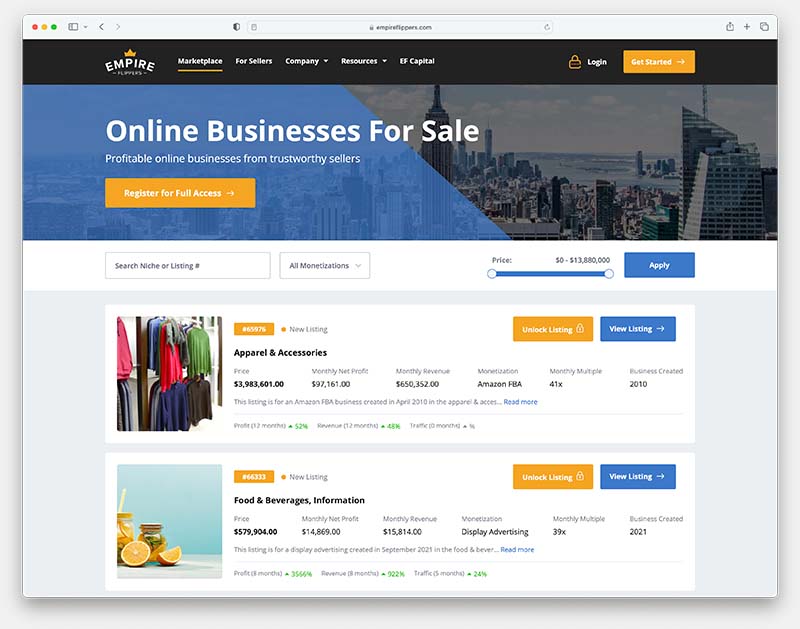
No comments